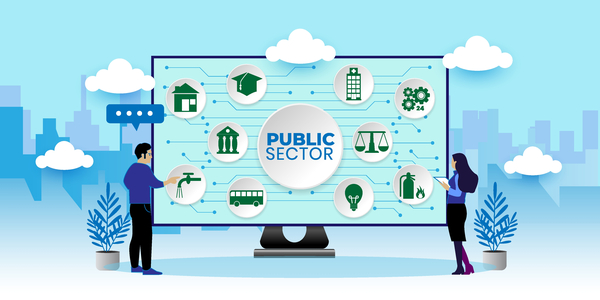Prior to the COVID-19 outbreak, the pace of digital transformation across local authority and health services was already accelerating, with innovative solutions designed to increase engagement, widen automation and deliver more bang for the public sector buck arriving across the country.
Over the past year in particular, local authorities and health services have been pivotal to managing the impact of the pandemic, protecting public health and providing that vital connection between national government policy and the population at large. In doing so, they have faced huge organisational and technology challenges. But, in working to quickly meet the needs of their communities and employees, they have gained invaluable experience that will shape the design and delivery of public services for years to come.
But what did this mean in practice? To find out, we brought together some of the innovators responsible for transformational service and technology strategy across Suffolk County Council (SCC). Speaking during our recent webinar, ‘Technology To Deliver Improved Outcomes For Local Authority and Health Services’, it was fascinating to hear first-hand about their experiences, both before and during the pandemic.
Coronawatch Dashboard - From Data To Insight
Focusing first on the challenges experienced over the past year, one of the key requirements in understanding and managing the local authority response to the pandemic, we heard from Rebecca Allen Head of C-19 Analytics – Knowledge & Intelligence, at Suffolk County Council. She described how the collection of data – and crucially – moving from data to insight, played a huge role in their ability to make decisions quickly and with evidence-based confidence.
She began by explaining that at the outset of the crisis, local authority public health teams faced the information and communication requirements with inadequate, Excel-based data sets, which in turn impacted their ability to turn data into decisions. In response, they moved to develop what became known as their ‘Coronawatch’ dashboard, designed to provide not only public access to critical COVID-19 information, but also available in greater depth privately for key stakeholders, partners and decision-makers.
Visualised as a series of dashboards using Microsoft PowerBI, the solution – developed in partnership with IJYI – was developed to increase the stability and resilience of their infrastructure, reduce the need for manual data input and automate a range of key processes to deliver the agility required.
The service infrastructure was migrated to a secure cloud-based solution, and as a result, SCC now operates an agile, high performance public and professional healthcare information and insight service offering access to vital data sources in an accessible and timely format. Not only has this experience delivered a powerful set of capabilities to help address major public health issues, it has also helped inform the way the Council and colleagues from other local government organisations approach the collection, analysis, management and delivery of data and the vital guidance it can provide.
Tech-led Innovation In Educational Psychology
We then heard from Claire Darwin and Gareth Morris of Suffolk County Council, who have been engaged in an important initiative to develop an Educational Psychology analysis and consultation tool to support Children and Young People in their educational setting.
Darwin, a highly experienced Educational Psychologist, described how the development of an ‘Analysis of Additional Needs’ screening tool (AANT), began 10 years ago as an Excel-based process to help professionals record, plan and agree pathways to help young people on their educational journey.
As part of its development, SharePoint-based teleconsultation services were added to support face-to-face contact, but there remained the need to enhance its capabilities further by taking it online to optimise information gathering and help SCC’s educational psychologists to improve processes, efficiency and outcomes. Adding Teams functionality would also broaden the scope and effectiveness of the AANT to support the vital consultation process.
Working with IJYI to design and develop the solution, both Darwin and Morris, who is Senior Technical Lead at SCC, participated in an IJYI-led Inception Workshop to help define the scope of the project. With Educational Psychologists and technical specialists in the same room, the Workshop helped identify the priorities and deliverables.
The overall objective was to deliver an easily accessible solution, build an effective assessment process, ensure secure storage and give psychologists the ability to provide interventions as early as possible.
Driven by IJYI’s agile development processes, the SCC team now has an effective psychological process in place, backed by modern IT. As Morris explained, “From a technical perspective, IJYI certainly made my job easier. They freely accepted the hosting, security and support requirements for the project and really made us feel part of the team during the development process. We also asked our security consultants to carry out a full security review of the application, and they were incredibly complimentary about how the app had been coded.”
This enhanced version of AANT has quickly delivered a range of benefits, including a positive effect on young people, staff and families, improved collaboration, and most important of all, enabling the SCC team to reach more children and young people.
An Exciting Road Ahead
On a broader level, it’s clear that public sector healthcare organisations are on a journey which will transform their use of technology in general and data in particular, not just in crisis situations, but in the provision of general preventative medicine and treatment services.
As explained by James Duez, Co-Founder and CEO of Rainbird, an intelligent automation specialist, the data challenges facing public health providers are increasingly being addressed by Artificial Intelligence (AI) and Machine Learning (ML) technologies.
Critical to the requirements of the professionals and patients alike, however, is that intelligent solutions are founded on human expertise in order to build models that will deliver contextual advice, rather than replace the interaction between doctors, nurses and patients. ML solutions are already being applied to large data sets, for instance, in order to make predictions and help medical professionals optimise both the use of their time and the finite resources at their disposal.
Looking further ahead, he sees a huge opportunity to apply these technologies across a range of healthcare challenges such as waiting list prioritisation, risk assessment and general decision support to underpin human judgement. These developments, however, must engender trust across all stakeholders, especially patients, but by taking the ‘heavy lifting’ away from busy healthcare professionals, technology has a huge role to play in the future development of the NHS on a national and local level.
To learn more about our Suffolk County Council case study, click here.





About the author
IJYI Ltd
IJYI Ltd.